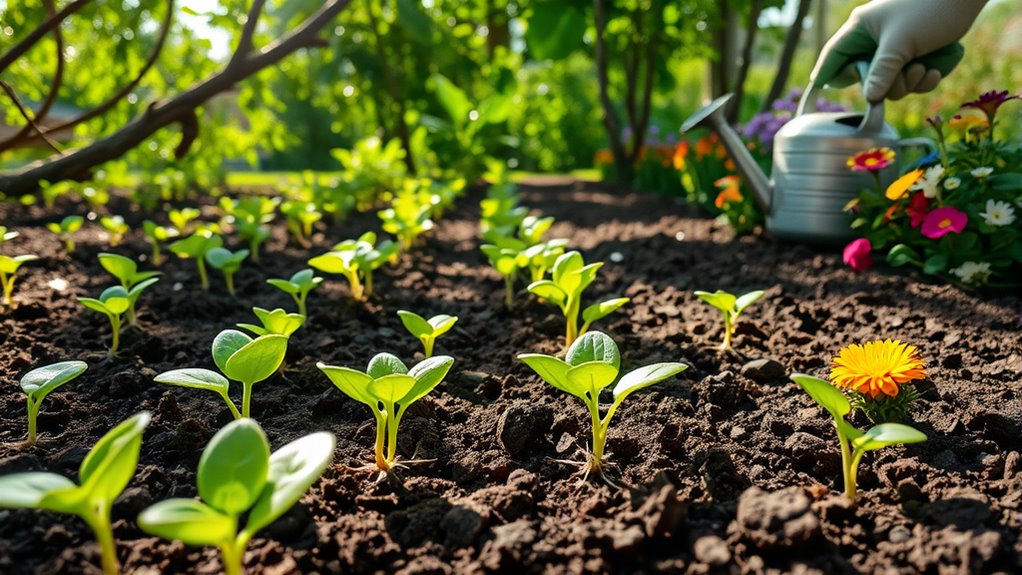When starting a garden, many beginners overlook hidden costs like tools and supplies, and the importance of proper soil preparation. Wildlife can cause surprise damage, and plants often have their own needs and signals, so patience and observation are essential. Investing time and effort early on saves money and frustration later. If you keep exploring, you’ll discover how to handle these challenges and create a thriving garden that truly blossoms.
Key Takeaways
- Starting small can hide hidden costs like tools and supplies, impacting your budget unexpectedly.
- Proper soil preparation and testing are crucial for healthy plant growth and long-term garden success.
- Wildlife can cause unforeseen damage, so plan barriers and deterrents early to protect your plants.
- Plants communicate their needs through signals; recognizing these helps tailor your care for better results.
- Patience is essential; plants grow at their own pace, and rushing or overreacting can hinder progress.
The Hidden Cost of Starting Small
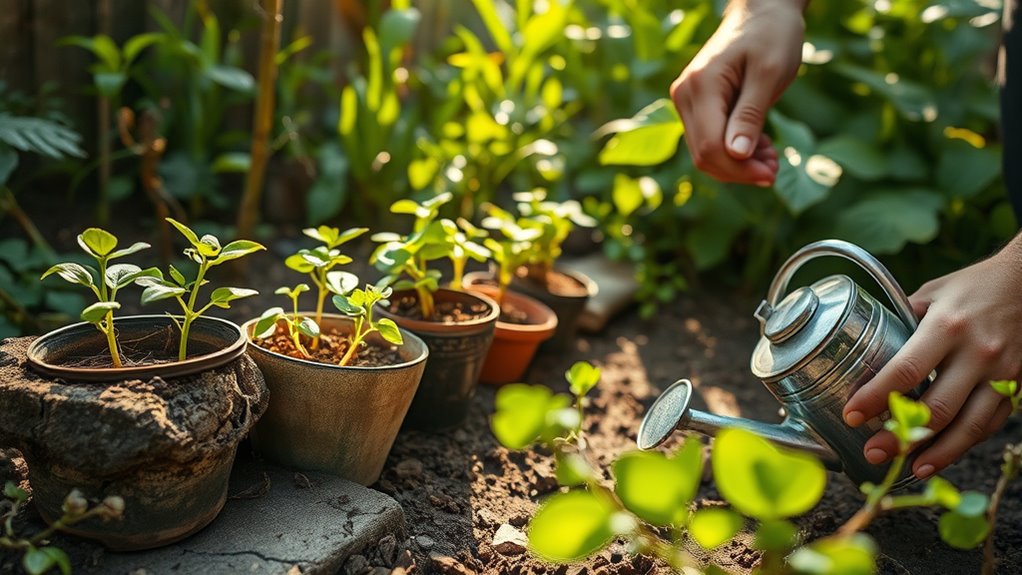
Starting small in gardening might seem budget-friendly, but it can hide some unexpected costs. For example, you might overlook expenses like tool costs, which add up quickly even for beginner setups. Investing in quality tools now can save money long-term, but initially, it may seem like an unnecessary expense. Additionally, you might not realize that some garden grants are available to help offset costs, but applying for them takes time and effort. These grants can cover supplies or equipment, easing the financial burden. Without proper planning, small-scale gardening can lead to surprise expenses that strain your budget. Being aware of these hidden costs helps you budget smarter and makes your gardening journey more enjoyable and sustainable. Also, understanding the symptoms of plant diseases can prevent costly crop losses early on.
The Importance of Soil Preparation
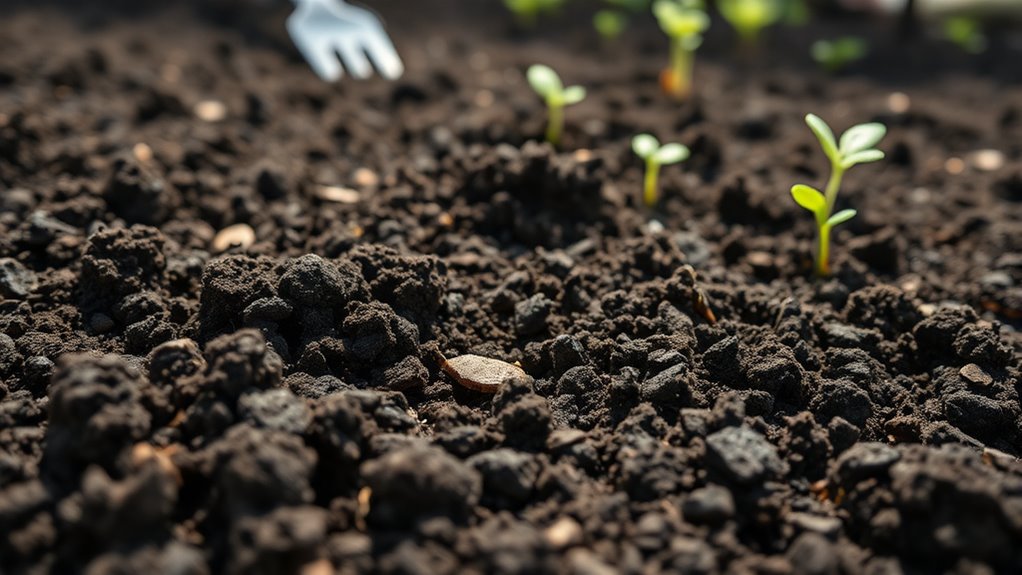
Before planting, preparing your soil is essential for healthy growth. Start with composting basics to enrich the soil naturally, adding nutrients your plants need. Compost improves soil structure, increases water retention, and encourages beneficial microorganisms. It’s also wise to perform soil testing to understand your soil’s pH and nutrient levels. Testing helps you identify deficiencies or imbalances, guiding you to amend the soil properly. By investing time in soil preparation, you ensure your plants have a strong foundation to thrive. Healthy soil leads to healthier plants, better yields, and less disease. Remember, good soil preparation is not a one-time task; keep testing and amending your soil as your garden develops. Proper groundwork saves you time and effort in the long run. Regular maintenance, like soil testing, can help monitor and maintain optimal conditions for your plants’ growth.
Dealing With Unpredictable Wildlife
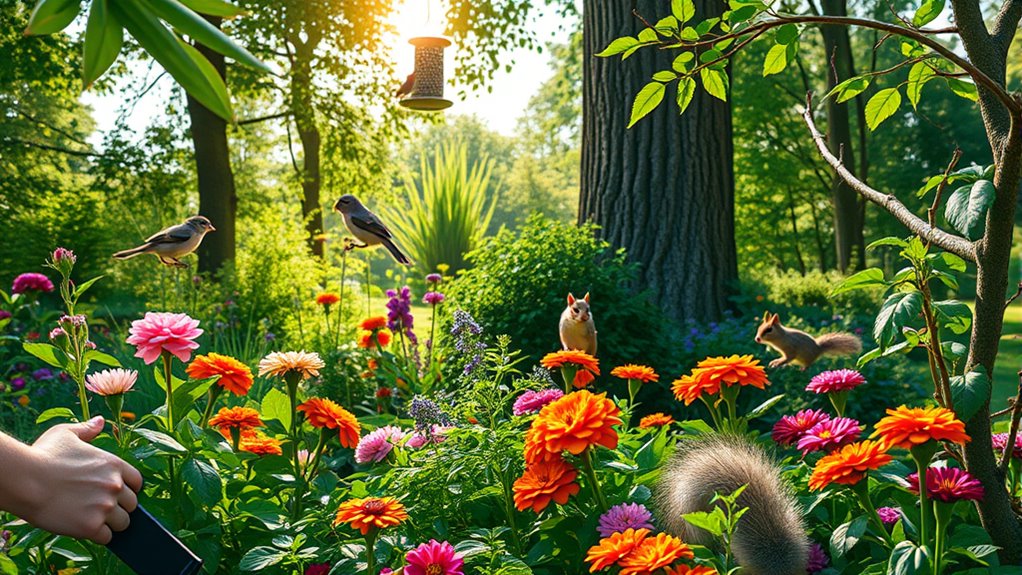
Wildlife can be unpredictable, often showing up unexpectedly and causing damage to your garden. To protect your plants, consider using bird deterrents like reflective tape or decoys to keep birds from pecking at your crops. Creating barriers such as fencing or netting can also help keep larger animals out. Remember, your garden may attract wildlife habitats, so providing alternative spaces away from your garden can reduce the chances of unwanted visitors. Keep trash secured and avoid leaving food scraps outside, which can draw in animals. Regularly monitor your garden for signs of wildlife activity and respond quickly. Using electric bikes or similar tools for garden maintenance can help you access hard-to-reach areas efficiently and safely. By understanding wildlife behavior and setting up effective deterrents, you can enjoy a thriving garden without the frustration of unexpected visits.
Plants Have Personalities Too
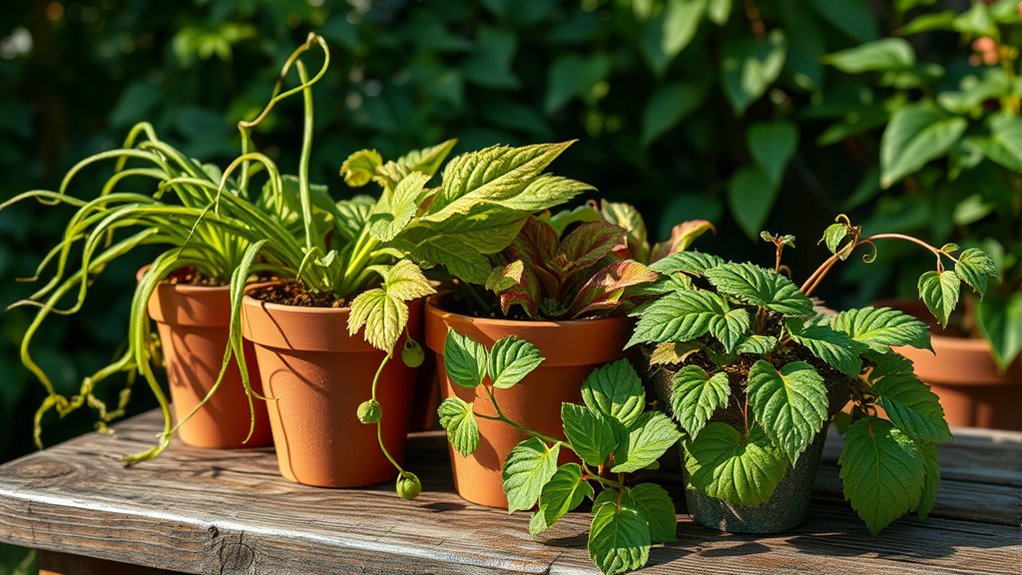
Just as animals in your garden have their own behaviors, plants also exhibit distinct personalities that can influence how they grow and respond to their environment. Recognizing botanical behavior helps you understand that plants communicate through signals like color changes, leaf movements, or root growth. Some thrive in direct sunlight, while others prefer shade, showcasing their unique preferences. By observing these subtle cues, you can better cater to each plant’s needs. Additionally, understanding water requirements can significantly improve your gardening success.
Patience Is Your Best Garden Tool
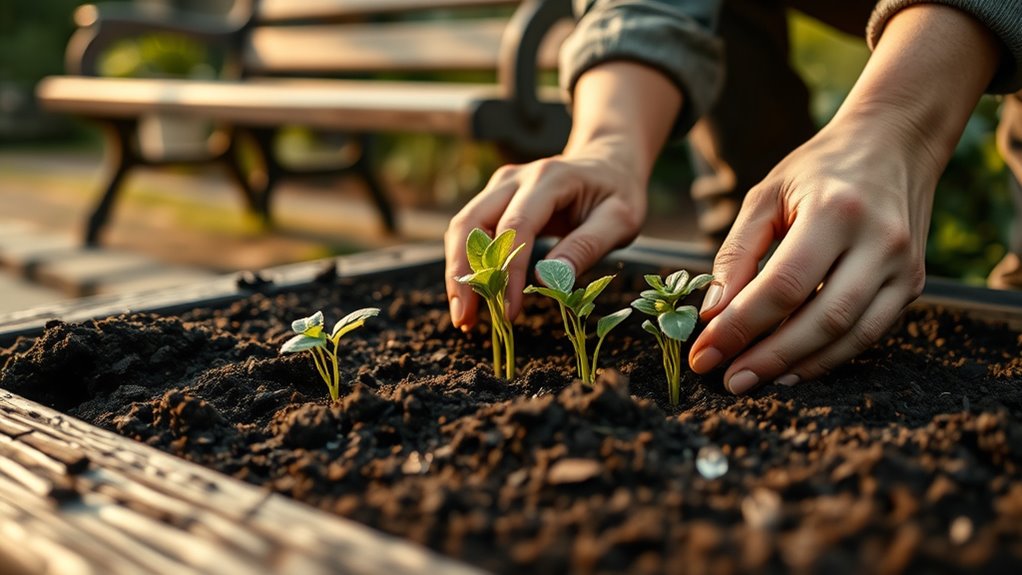
Gardening teaches patience because plants don’t grow on your schedule; they develop at their own pace. You’ll notice growth varies, and that’s normal. Good watering habits are essential—you must give plants enough moisture without overdoing it, which helps prevent stress and pests. Consistent watering encourages healthy roots and steady growth. When pests appear, resist the urge to rush into chemical solutions. Instead, practice patience with pest management, using natural methods and monitoring your plants regularly. Recognizing that setbacks, like slow growth or pest issues, aren’t failures—they’re part of the learning process. Over time, your patience will be rewarded with thriving plants and a more fulfilling gardening experience. Remember, tending your garden isn’t about instant results; it’s about nurturing patience along with your plants. Additionally, choosing the right planters for specific plants can significantly influence growth success and overall health.
Frequently Asked Questions
How Do I Choose the Right Plants for My Climate?
To choose the right plants for your climate, start by knowing your local climate zones and plant hardiness ratings. Check your USDA zone map and select plants labeled for your zone, ensuring they can survive your area’s temperature ranges. Consider factors like sunlight, rainfall, and soil type too. By matching plants with your specific climate conditions, you’ll increase your chances of a thriving garden that requires less effort and fewer surprises.
What Are Common Beginner Mistakes to Avoid?
Think of your garden as a delicate dance—you need to stay in sync. Avoid rushing soil preparation, as skipping it can lead to poor plant growth. Don’t ignore pest management; pests can quickly turn your garden into a battleground. Water too little or too much, and plant too densely. Keep these mistakes in mind, stay attentive, and your garden will flourish instead of flounder.
How Often Should I Water My Garden?
You should water your garden early in the morning or late in the afternoon to maintain a consistent watering schedule that supports healthy plant hydration. Generally, aim to water deeply about 2-3 times a week, adjusting based on weather and soil conditions. Keep an eye on your plants for signs of thirst, like wilting or yellowing leaves, and avoid overwatering to prevent root rot. Consistency is key for thriving garden growth.
Can I Grow Vegetables in Small Spaces?
Think of your small space as a tiny island waiting to flourish. Yes, you can grow vegetables using container gardening and vertical planting techniques. You’ll turn limited land into a lush, productive oasis by stacking plants upward and using pots creatively. With proper care, sunlight, and watering, your small garden can yield a surprising variety of vegetables, proving that even limited space holds big potential for fresh, homegrown produce.
What Tools Are Essential for Starting a Garden?
You’ll need basic tools like a trowel, pruning shears, and gloves to start your garden. Make sure you have good garden soil to promote healthy plant growth. Keep an eye out for garden pests, and use organic methods or barriers to protect your plants. These essential tools and knowledge help you create a thriving garden, even in small spaces, making your gardening journey enjoyable and successful.
Conclusion
Gardening isn’t just about planting; it’s about patience, understanding, and respecting nature’s unpredictability. Many believe success comes quickly, but true growth takes time—like a theory that patience yields better results than haste. Embrace the surprises, learn from setbacks, and remember that every challenge teaches you something valuable. Your garden, like life, thrives when nurtured with care and persistence. Trust the process, and you’ll find beauty in the journey.

